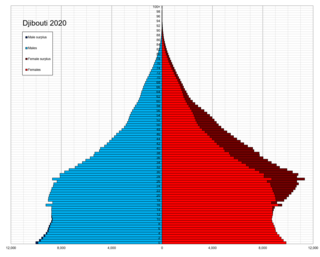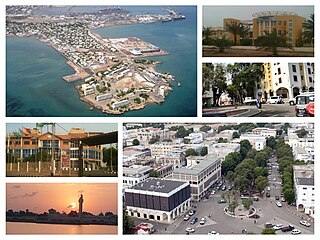Djibouti is a country in the Horn of Africa bordered by Somaliland to the east, Eritrea to west and the Red Sea to the north, Ethiopia to the west and south, and the Gulf of Aden to the east.

Demographic features of Djibouti include population density, ethnicity, education level, health, economic status, religious affiliations and other aspects.
Dravidian, Dravidan, or Dravida may refer to:

The national flag of Djibouti is a horizontal flag bicolor with equal bands of light blue and light green, with a white, equilateral triangle at the hoist. In the center of the triangle is a red star. The flag combines the basic layout and colors from the flag of the Front de Libération de la Côte des Somalis. The light blue represents the sky and the sea, as well as the Somalis, green represents the everlasting green of the earth, as well as the Afars, white represents the colour of peace and the five point red star represents unity, the blood shed by the martyrs of independence, as well as Djibouti being one of the five regions inhabited by the Somali people.

"We arise with strength! for we have raised our flag" - "Djibouti" is the national anthem of Djibouti. Adopted upon independence from France in 1977, the lyrics, which are in Somali, were written by Aden Elmi, while the melody was composed by Abdi Robleh.
Afar is an Afroasiatic language belonging to the Cushitic branch. It is spoken by the Afar people inhabiting Djibouti, Eritrea and Ethiopia.

The culture of the Republic of Djibouti is diverse, due to the nation's Red Sea location at a crossroads of trade and commerce.

Djibouti is the capital of Djibouti. It is located in the coastal Djibouti Region on the Gulf of Tadjoura.

The Djiboutian Music refers to the musical styles, techniques and sounds of Djibouti. The first major form of modern Djiboutian music began in the mid-1940s, when Djibouti was a part of the French Somaliland. Djiboutian music is characterized by poetry, so that listening to a Djiboutian song is first paying attention to its meaning. The artist rocks the listeners in the cheerfulness of the refrains and the turn of the sentences. Often sung by a couple, a song is played in the form of a sleight of hand between a man and a woman, one recounting his feelings and his love, even his passion for the other, until the other accepts or rejects this offer.

The Afar, also known as the Danakil, Adali and Odali, are a Cushitic ethnic group inhabiting the Horn of Africa. They primarily live in the Afar Region of Ethiopia and in northern Djibouti, as well as the entire southern coast of Eritrea. The Afar speak the Afar language, which is part of the Cushitic branch of the Afroasiatic family. Afars are the only inhabitants of the Horn of Africa whose traditional territories border both the Red Sea and the Gulf of Aden.

Mahamoud Ali Youssouf (Afar: Macamud Qali Yuusuf, Somali: Maxamuud Cali Yuusuf, Arabic: محمود علي يوسف; born 2 September 1965) is a Djiboutian diplomat. He has served in the government of Djibouti as Minister of Foreign Affairs since 2005.

The following outline is provided as an overview of and topical guide to Djibouti:

The Djiboutians are the people inhabiting or originating from Djibouti. The country is mainly composed of two ethnic groups, the Somali and the Afar. It has many languages - though Somali and Afar are the most widely spoken ones, Arabic and French serve as the official languages. There is a small Djiboutian diaspora in North America, Europe, and Australia.

Djibouti, officially the Republic of Djibouti, is a country in the Horn of Africa, bordered by Somalia to the south, Ethiopia to the southwest, Eritrea in the north, and the Red Sea and the Gulf of Aden to the east. The country has an area of 23,200 km2 (8,958 sq mi).

The languages of Djibouti include Afar, Arabic, Somali and French. Somali and Afar are the most widely spoken tongues, and Arabic and French serve as the official languages.
This page is based on this
Wikipedia article Text is available under the
CC BY-SA 4.0 license; additional terms may apply.
Images, videos and audio are available under their respective licenses.







